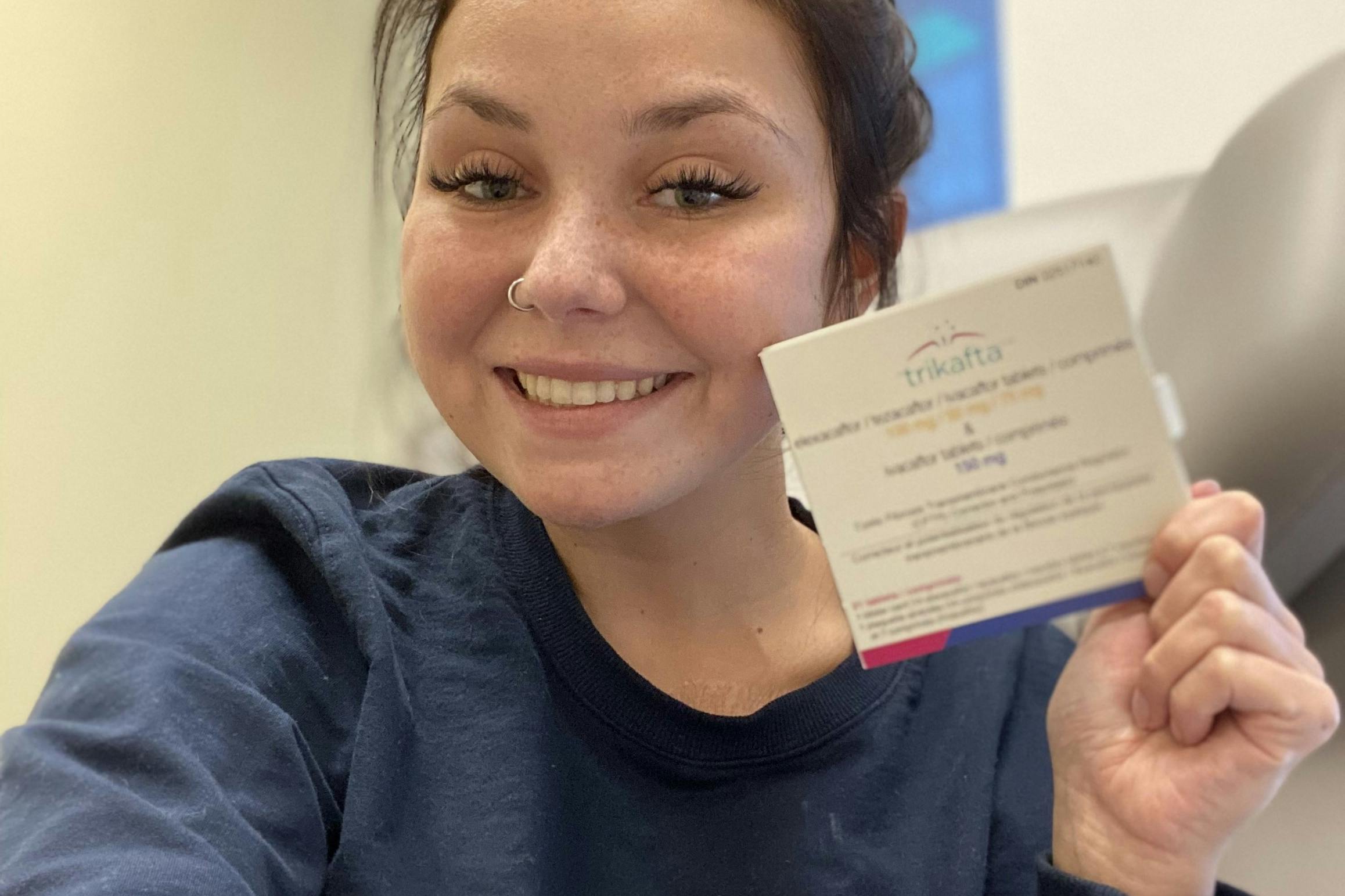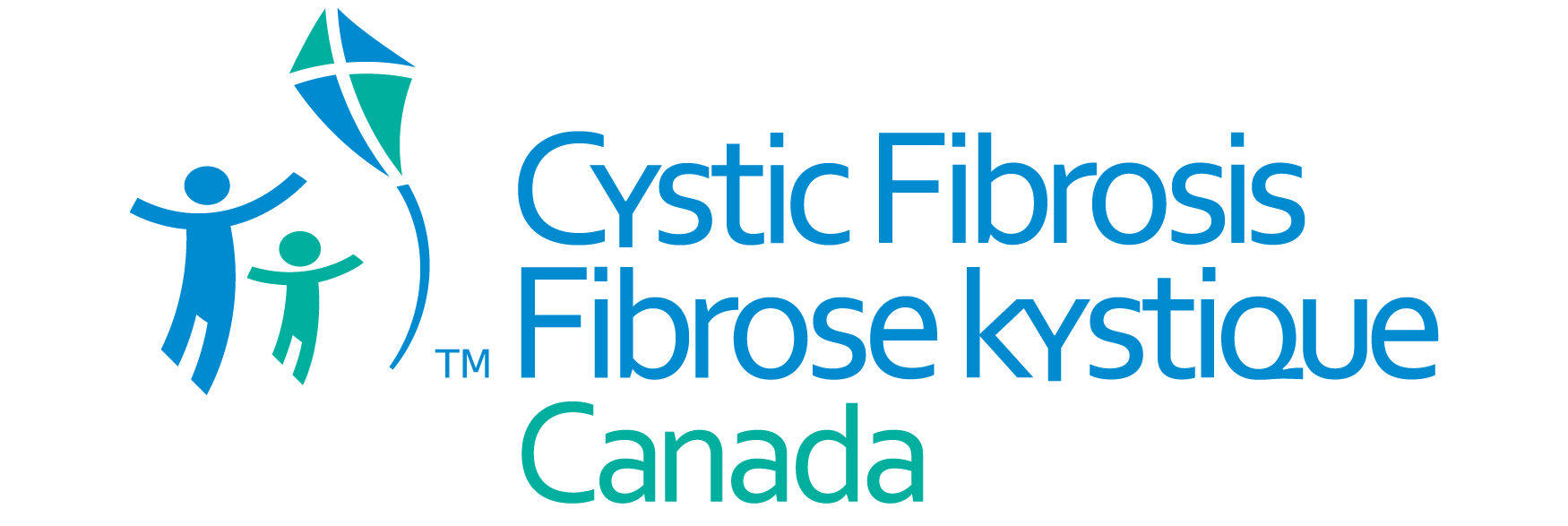Highly Effective Modulators
CF Modulator therapies, like Trikafta, have been a game changer for cystic fibrosis treatment. We’ve compiled some information about the different types of CFTR modulator therapies available today.

What are CFTR modulators and how do they work?
Cystic fibrosis transmembrane conductance regulator (CFTR) modulator therapies work to correct the malfunctioning protein made by the CFTR gene. There are a few different CFTR modulators available that target specific mutations.
In people with CF, mutations in the CFTR gene result in either a defective protein being produced or no protein at all. The CFTR protein regulates the proper flow of water and chloride in and out of cells lining the lungs and other organs. A defect in this protein results in a buildup of thick, sticky mucus, which can lead to infections in the lungs and damage to the pancreas. It can also lead to problems in other parts of the body. CFTR modulator therapies, such as Trikafta, are designed to help the malfunctioning protein work better.
Cystic Fibrosis Canada is currently advocating for access to CF modulator therapies for all who can benefit, including people with responsive rare CF mutations.

What modulators are available?
There are four CFTR modulators approved for sale in Canada. Three of these – Kalydeco, Orkambi and Trikafta - are publicly funded, some with restrictions. One modulator - Symdeko – is only available through some private insurance plans. An additonal modulator, Alyftrek, is not currently available in Canada.
Kalydeco
Kalydeco (ivacaftor) is the first-generation modulator, treating between 4-5% of the Canadian cystic fibrosis population. Kalydeco is approved for treatment of cystic fibrosis for those 2 months of age and older who have one of the following mutations: G551D, G1244E, G1349D, G178R, G551S, S1251N, S1255P, S549N, S549R, or R117H. Kalydeco is available through some public and private drug plans, in some cases only for certain mutations. In other countries the list of mutations approved for Kalydeco is different. For example, in the United States, Kalydeco is approved for use in people with any of 97 different CF mutations. All mutations approved for the use of Kalydeco in Canada have also been approved by Health Canada for the use of Trikafta. It is anticipated that most people on Kalydeco will see additional benefits by moving to Trikafta.
Orkambi and Symdeko
Orkambi (lumacaftor and ivacaftor) and Symdeko (tezacaftor and ivacaftor) are second-generation modulators. Orkambi can treat the approximately 50% of the Canadian cystic fibrosis population that carry two copies of the most common CF mutation (F508del) and is approved by Health Canada for use in people age 1+. Orkambi is funded by some public and private drug programs with limitations. Health Canada has approved Symdeko for people age 12+ with two copies of the F508del mutation, or one copy of F508del and one copy of any of the following mutations: P67L, D110H, R117C, L206W, R352Q, A455E, D579G, 711+3A→G, S945L, S977F, R1070W, D1152H, 2789+5G→A, 3272-26A→G, and 3849+10kbC→T. No public drug plans fund Symdeko, but some private drug programs do. People over the age of 2 who are indicated for Orkambi and Symdeko are also indicated for the more effective modulator, Trikafta. It is anticipated that most individuals on either Orkambi or Symdeko will transition to this more effective CFTR modulator once they reach 2 years of age.
Alyftrek
Alyftrek is a once-a-day triple combination modulator therapy comprised of deutivacaftor, vanzacaftor and tezacaftor. Similar to Trikafta, Alytrek targets CFTR protein defects caused by the F508del mutation or another mutation responsive to the drug.
Alyftrek may be a future therapeutic option for some people with rare mutations that can’t be treated by Trikafta, as well as for some people who cannot tolerate Trikafta. Please speak to your cystic fibrosis clinician for more information.
Alyftrek was approved by Health Canada for the most common CF mutation, Fdel508 and for other responsive mutations in July 2025. Cystic Fibrosis Canada now calls on Canada’s Drug Agency (CDA) and Quebec’s Institut national d'excellence en santé et en services sociaux (INESSS) to recommend that public drug plans fund Alyftrek for the indications approved by Health Canada and any other mutations that may be found to respond to the therapy, and for private payers to add Alyftrek to their list of covered drugs and provide broad coverage. The recommendations from the CDA and INESSS are expected in the fall of 2025.
Trikafta
Trikafta is a twice a day third-generation triple combination modulator therapy, adding elexacaftor to tezacaftor and ivacaftor to target CFTR protein defects caused by the F508del mutation or another mutation responsive to the drug.
Trikafta is approved by Health Canada for individuals aged 2 years and older who have at least one copy of F508del mutation, or at least one copy of 152 additional rare mutations, listed here.
Currently, Trikafta is publicly funded across Canada through provincial, territorial and federal public drug programs for individuals aged 2 and older with at least one F508del mutation. For those aged 2 and older with at least one copy of the additional 152 rare mutations approved by Health Canada, public funding is available in most regions. As of 2024, some jurisdictions have extended coverage to anyone aged 2 and older who may benefit from Trikafta, beyond those with F508del or the listed 152 mutations.
How can I access Trikafta?
Accessing Trikafta is dependent upon your location in Canada. While the drug is approved for some, there are pathways based on location that may grant accessibility for others who may benefit from the drug. To learn more about how you can access Trikafta, we recommend speaking with your clinic team.
Alberta
Trikafta is publicly funded for anyone aged 2 and older who may benefit from the drug.
British Columbia
Trikafta is funded for individuals aged 2 and older with at least one copy of the F508del mutation or one copy of any of the 152 rare mutations approved by Health Canada. British Columbia also offers additional pathways to access for those with responsive mutations who fall outside of these criteria. We recommend speaking with your clinic team to explore available access options.
Manitoba
Trikafta is funded for individuals aged 2 and older living with at least one copy of F508del or one copy of any of the 152 rare CF mutations approved by Health Canada.
New Brunswick
Trikafta is funded for individuals aged 2 and older with at least one copy of the F508del mutation.
Newfoundland and Labrador
Trikafta is funded for individuals aged 2 and older living with at least one copy of F508del or one copy of any of the 152 rare CF mutations approved by Health Canada. Newfoundland and Labrador also offer additional pathways to access for those with responsive mutations who fall outside of these criteria. We recommend speaking with your clinic team to explore available access options.
Nova Scotia
Trikafta is publicly funded for anyone aged 2 and older who may benefit from the drug.
Northwest Territories
Trikafta is funded for individuals aged 2 and older with at least one copy of the F508del mutation or one copy of any of the 152 rare CF mutations approved by Health Canada.
Nunavut
Trikafta is funded for individuals aged 2 and older with at least one copy of the F508del mutation or one copy of any of the 152 rare CF mutations approved by Health Canada.
Ontario
Trikafta is funded for individuals aged 2 and older with at least one copy of the F508del mutation or one copy of any of the 152 rare mutations approved by Health Canada. Ontario also offers additional pathways to access for those who fall outside of these criteria. We recommend speaking with your clinic team to explore available access options.
Prince Edward Island
Trikafta is funded for individuals aged 2 and older with at least one copy of the F508del mutation or one copy of any of the 152 rare mutations approved by Health Canada.
Quebec
Trikafta is funded for individuals aged 2 and older living with at least one copy of F508del or one copy of any of the 152 rare CF mutations approved by Health Canada. For those that fall outside of the 152 mutations included, Quebec offers the "patient d'exception" program, which allows clinicians to apply for access to Trikafta on a case-by-case basis and has helped some people access other CFTR modulators in the past. We encourage you to work with your clinicians to explore this option.
Saskatchewan
Trikafta is funded for individuals aged 2 and older with at least one copy of the F508del mutation or one copy of any of the 152 rare mutations approved by Health Canada. Saskatchewan also offers additional pathways to access for those who fall outside of these criteria. We recommend speaking with your clinic team to explore available access options.
Yukon
Trikafta is funded for individuals aged 2 and older with at least one copy of the F508del mutation.
National
For those who are eligible for the Non-Insured Health Benefits (NIHB) program, Trikafta is funded for individuals aged 2 and older living with at least one copy of F508del or one copy of any of the 152 rare CF mutations approved by Health Canada.
Frequently Asked Questions
How beneficial can Trikafta be?
Canadian research published in the Journal of Cystic Fibrosis demonstrates that access to Trikafta in 2021 would result in profound health benefits for Canadians living with cystic fibrosis, and by 2023, Trikafta could reduce the number of people living with severe lung disease by 60% while reducing the number of deaths by 15%.
The findings show a significantly slower disease progression with an 18% increase in people with mild lung disease and 19% fewer hospitalizations or home intravenous antibiotics for pulmonary exacerbations. The estimated median age of survival for a child born with cystic fibrosis would increase by 9.2 years. Read more about this research.
Which cystic fibrosis mutations can benefit from Trikafta?
Clinical trials for Trikafta were initially conducted in people with at least one copy of the F508del mutation. In recent years, Trikafta has been shown to be beneficial for certain additional mutations through a clinical trial on 18 addition mutations, laboratory studies, and real-world evidence in CF patients. These data have demonstrated the drug to be effective in many more mutations. In the United States, for example, Trikafta is approved for 272 mutations, including F508del. Additional mutations beyond this list of 272 mayalso benefit.
Is Trikafta more effective than earlier generation CFTR modulator therapies?
Yes, and significantly so. On average, Trikafta use leads to a 14% increase in lung function over the untreated baseline. In clinical trials of the triple combination therapy, people with two copies of the F508del mutation had a 10% increase in lung function on average compared to treatment with Symdeko (that already provides a 4% increase over baseline), and people with a single copy of F508del had, on average, more than a 14% increase in lung function compared to treatment with the placebo. We believe based on unpublished data that the response of many of the rare mutations that are approved for Trikafta by Health Canada will be similar to that of F508del.
SOURCE:
VX-445–Tezacaftor–Ivacaftor in Patients with Cystic Fibrosis and One or Two Phe508del Alleles | NEJM
Elexacaftor–Tezacaftor–Ivacaftor for Cystic Fibrosis with a Single Phe508del Allele | NEJM
Will everyone who takes Trikafta see significant improvement?
Cystic fibrosis is a disease that shows up in different ways for different people, so individual responses to Trikafta will vary. Many people on Trikafta have experienced a dramatic increase in lung function while others have experienced a more moderate increase or no significant change in lung function. As a heterogenous disease, the response to Trikafta will be individual and as such, those who demonstrated a more muted improvement in lung function may have seen improvements in other areas that are equally as important to consider, such as in BMI or overall quality of life.
It is also important to note that some people may feel side effects while taking Trikafta, including rash, headache, changes to their mental health and abdominal pain. In all cases, Cystic Fibrosis Canada encourages patients to discuss how they are responding to Trikafta with their clinics.
Modulator Consensus Guidelines
CF Canada has worked alongside clinicians across Canada to develop guidelines on starting, stopping, and monitoring CFTR modulators such as Trikafta. To learn more about these guidelines, view them under Resources for Clinicians.
More about Modulator Consensus GuidelinesHelp increase access to Trikafta in Canada
Do you want to join the fight for access to life-saving cystic fibrosis treatments and other vital services in Canada? Learn more about our advocacy efforts, and how you can help.
Advocacy at CF Canada
